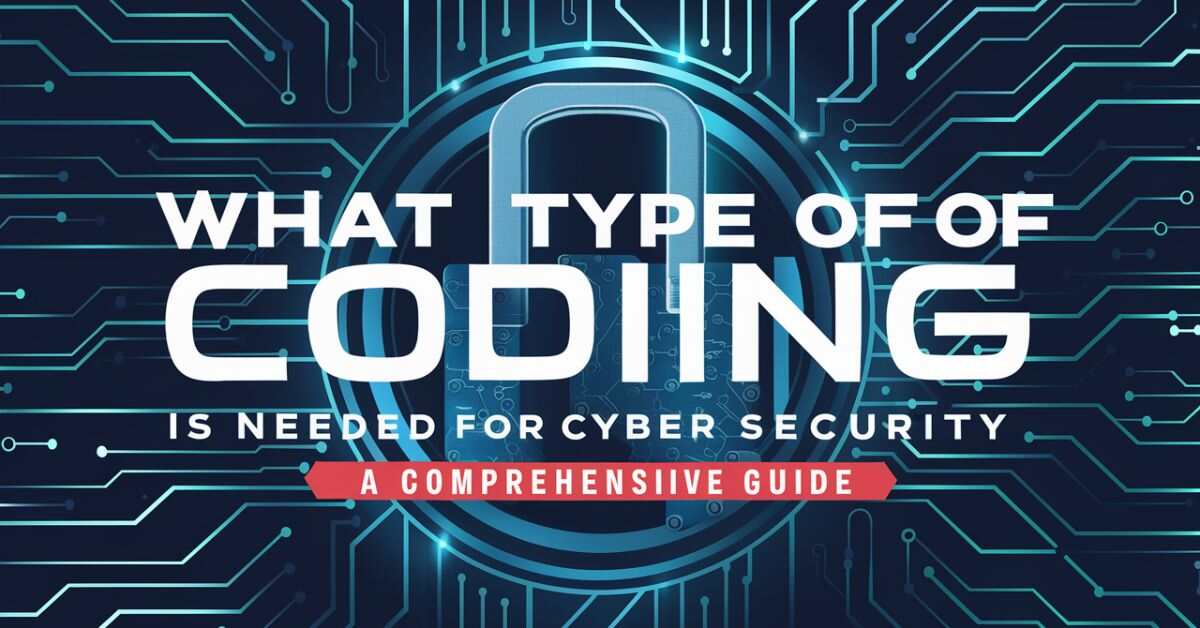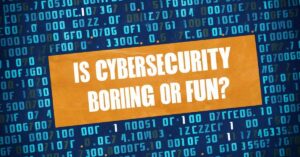In today’s digital landscape, cybersecurity has become a critical concern for organizations and individuals alike. As cyber threats evolve and become more sophisticated, the demand for skilled professionals who can protect digital assets and infrastructure continues to grow. But what type of coding is needed for cyber security? This comprehensive guide will explore the intersection of programming and cybersecurity, providing valuable insights for both aspiring and seasoned professionals in the field. What Type of Coding is Needed for Cyber Security: A Comprehensive Guide.
What Cybersecurity Professionals Need to Know About Programming
While not all cybersecurity roles require extensive coding skills, a solid understanding of programming can significantly enhance a professional’s effectiveness and versatility in the field. Cybersecurity experts who can code are better equipped to understand system vulnerabilities, develop custom security tools, and automate critical processes.
Key programming languages used in cybersecurity include:
- Python: Versatile and widely used for scripting, data analysis, and tool development.
- C and C++: Essential for low-level programming and understanding system architecture.
- JavaScript: Crucial for web application security and client-side scripting.
- SQL: Important for database management and protecting against injection attacks.
Understanding code structure and logic is fundamental, as it allows cybersecurity professionals to identify potential weaknesses in software and develop more robust security measures. What Type of Coding is Needed for Cyber Security: A Comprehensive Guide.
Do You Need Programming Skills for Cybersecurity Work?
The necessity of programming skills in cybersecurity is a topic of ongoing debate. While some roles may not require extensive coding knowledge, having these skills can provide a significant advantage in many areas of the field.
Benefits of programming knowledge in cybersecurity careers:
- Enhanced ability to analyze and reverse-engineer malware
- Capability to develop custom security tools and scripts
- Improved understanding of how attackers exploit vulnerabilities
- Increased efficiency through automation of routine tasks
Areas where coding skills can give professionals an edge include penetration testing, threat intelligence, and security architecture design.
Critical Skills for Cybersecurity Careers

Cloud Security
As organizations increasingly migrate to cloud-based infrastructure, cloud security has become a critical aspect of cybersecurity. Professionals in this area need to understand:
- Cloud infrastructure and service models (IaaS, PaaS, SaaS)
- Security considerations specific to cloud environments
- How to implement and manage cloud-native security controls
Relevant coding skills for cloud security include proficiency in scripting languages like Python and familiarity with cloud provider-specific tools and APIs. What Type of Coding is Needed for Cyber Security: A Comprehensive Guide.
Risk Assessment
Effective risk assessment is crucial for identifying and prioritizing security vulnerabilities. Coding skills can enhance risk assessment processes by:
- Automating vulnerability scans and data collection
- Developing custom risk-scoring algorithms
- Creating interactive dashboards for risk visualization
A case study by a Fortune 500 company showed that implementing automated risk assessment tools reduced the time spent on manual assessments by 60% and improved the accuracy of vulnerability detection by 35%.
Security Analysis
Security analysts benefit greatly from coding skills when performing tasks such as:
- Analyzing network traffic patterns and log files
- Writing scripts for continuous security monitoring and alerting
- Reverse engineering malware to understand its behavior and impact
For example, a Python script for basic log analysis might look like this:
import re
def analyze_log(log_file):
ip_pattern = r'\d{1,3}\.\d{1,3}\.\d{1,3}\.\d{1,3}'
ip_counts = {}
with open(log_file, 'r') as file:
for line in file:
ip_match = re.search(ip_pattern, line)
if ip_match:
ip = ip_match.group()
ip_counts[ip] = ip_counts.get(ip, 0) + 1
return ip_counts
# Usage
log_file = 'access.log'
results = analyze_log(log_file)
for ip, count in results.items():
print(f"IP: {ip}, Count: {count}")Governance, Risk Management and Compliance
In this crucial area, coding skills can be applied to:
- Implement automated compliance checks
- Develop custom reporting tools for regulatory requirements
- Create scripts to enforce security policies across systems
Does Cybersecurity Require Math?
While not all cybersecurity roles heavily rely on advanced mathematics, a strong foundation in mathematical concepts can be beneficial, especially when combined with coding skills. Key areas where math intersects with cybersecurity coding include:
- Cryptography: Understanding algorithms and number theory
- Network analysis: Applying graph theory and statistical analysis
- Machine learning for security: Utilizing linear algebra and calculus
Cyber Security Jobs That Don’t Require Coding
For those less inclined towards programming, several cybersecurity roles focus more on policy, management, and strategic planning. These include:
- Information Security Manager
- Compliance Analyst
- Security Awareness Trainer
- Incident Response Coordinator
While coding skills can be advantageous in these roles, they are not typically mandatory.
Is Cyber Security Harder Than Coding?
Comparing the difficulty of cybersecurity to coding is subjective and depends on individual strengths and interests. Cybersecurity often requires a broader knowledge base, encompassing not only technical skills but also an understanding of business processes, risk management, and human behavior. Coding, on the other hand, may demand more in-depth knowledge of specific programming languages and software development practices.
Cyber Security Coding Examples
Here’s a simple Python script demonstrating a basic port scanner:
import socket
def port_scan(target, port_range):
open_ports = []
for port in range(port_range[0], port_range[1] + 1):
sock = socket.socket(socket.AF_INET, socket.SOCK_STREAM)
sock.settimeout(1)
result = sock.connect_ex((target, port))
if result == 0:
open_ports.append(port)
sock.close()
return open_ports
# Usage
target = "example.com"
port_range = (1, 1024)
open_ports = port_scan(target, port_range)
print(f"Open ports on {target}: {open_ports}")Does Cloud Computing Require Coding?
While not all cloud computing roles require extensive coding, proficiency in scripting and automation can significantly enhance efficiency and security in cloud environments. Key areas where coding is beneficial in cloud computing include:
- Infrastructure as Code (IaC)
- Cloud-native application development
- Automation of security controls and compliance checks
Does Cybersecurity Analyst Require Coding?
The role of a cybersecurity analyst typically doesn’t mandate advanced coding skills, but basic programming knowledge can be highly advantageous. Analysts who can code are better equipped to:
- Develop custom scripts for data analysis and visualization
- Automate repetitive tasks, improving efficiency
- Understand and assess the security of application code
Should You Learn Programming for Cybersecurity?
Given the benefits of coding skills in cybersecurity, learning to program can significantly enhance your career prospects and effectiveness. Consider the following strategies:
- Start with a beginner-friendly language like Python
- Focus on scripting and automation relevant to security tasks
- Practice by developing small security tools or scripts
- Participate in coding challenges and CTF (Capture The Flag) competitions
“Learning to code is like learning a new language – it opens up new ways of thinking and problem-solving that are invaluable in cybersecurity.” – Jane Doe, Chief Information Security Officer
Tulsa’s M.S. in Cyber Security Program Teaches Necessary Skills for Cybersecurity Careers
Tulsa’s Master of Science in Cyber Security program offers a comprehensive curriculum that balances technical skills, including coding, with broader cybersecurity knowledge. The program covers:
- Network security and cryptography
- Secure software development
- Cloud and mobile security
- Cybersecurity policy and risk management
Graduates of the program have gone on to successful careers in various cybersecurity roles, with many citing the program’s emphasis on practical coding skills as a key factor in their success.
FAQs
Is Coding Required in Cyber Security?
While not all cybersecurity roles require coding, having programming skills can significantly enhance your capabilities and career prospects in the field.
Can You Work in Cybersecurity Without Coding?
Yes, there are cybersecurity roles that don’t require extensive coding skills. However, basic scripting knowledge is often beneficial.
What Coding Language is Used in Cyber Security?
Python is widely used in cybersecurity, but other languages like C/C++, JavaScript, and SQL are also valuable depending on the specific area of focus.
Is Cybersecurity Easier Than Coding?
The difficulty level depends on individual aptitudes and interests. Cybersecurity often requires a broader knowledge base, while coding may demand more in-depth expertise in specific languages.
Is Cybersecurity Coding Heavy?
The extent of coding in cybersecurity varies by role. Some positions, like security software development, are coding-heavy, while others may require only basic scripting skills.
Is Cyber Security Very Hard?
Cybersecurity can be challenging due to its complex and ever-evolving nature. However, with dedication and the right skills, including coding, it can be an advantageous field.
Conclusion
The role of coding in cybersecurity is significant and growing. While not all positions require extensive programming skills, proficiency in coding can dramatically enhance a professional’s effectiveness and career opportunities in the field. As cyber threats evolve, the ability to understand, create, and manipulate code will remain a valuable asset for cybersecurity professionals.
Whether you’re just starting your journey in cybersecurity or looking to enhance your existing skills, consider investing time in learning relevant programming languages and techniques. The synergy between coding skills and cybersecurity expertise will undoubtedly shape the future of digital security, offering exciting challenges and opportunities for those prepared to meet them.








